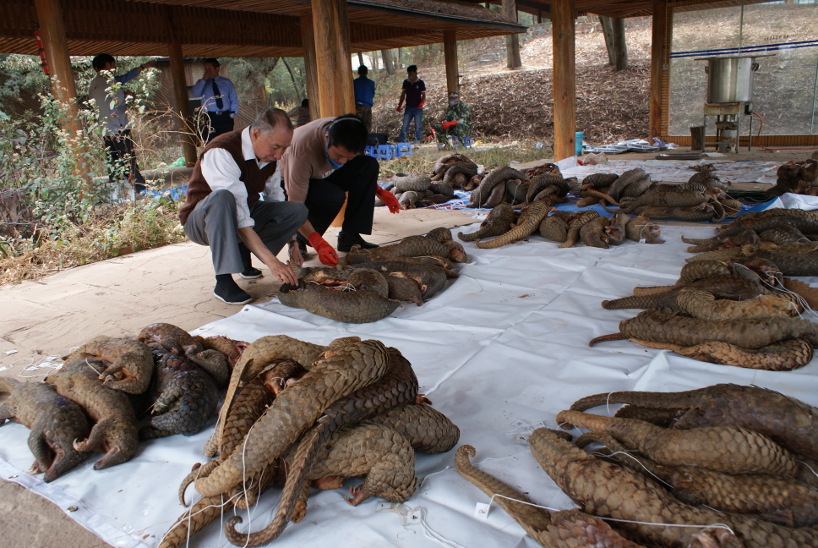News
Exposing the ‘scale’ of Pangolin persecution
‘Scaling up pangolin protection in China’ by Zhao-Min Zhou, Youbing Zhou, Chris Newman and David W. Macdonald. Published in: Frontiers in Ecology and the Environment (http://www.esajournals.org/doi/abs/10.1890/14.WB.001)
In collaboration with the Chinese Public Security Bureau and the Chinese Academy of Sciences, our report, out today in the journal ‘Frontiers in Ecology and the Environment’, exposes increasing transnational and inter-continental illegal trade in pangolins, and their scales; with implications for CITES, animal welfare, criminal activity and the need for greater public education.
Illegal trade is one of the key threats for wildlife survival and conservation, where poching of charismatic mega-fauna products has received widespread attention, with 35,000 elephants slaughtered for their ivory and 810 rhinos for their horns in 2012.Trade in smaller, and more common species (and their derivatives), however, is often overlooked. This is despite the economic significance of wildlife trade to the criminal culture it supports (The Clinton Foundation linking ivory poaching to terrorism in a report last November), contraventions of welfare standards and CITES legislation, impacts on ecosystem functionality, and where consumption as food or in Chinese Traditional Medicine is involved, issues for public health.
Ours is the first situation report pertaining to trade in the world’s most heavily trafficked CITES protected mammal contraband – the pangolin.
Like elephants and rhinos, pangolins are ‘EDGE’ species (Evolutionarily Distinct and Globally Endangered), with six of eight species classified as Endangered, or Near Threatened, on the IUCN Red List.
When in jeopardy pangolins roll into a ball, conveniently bundled into a sack, thus pangolin contraband is tractable and easily goes unnoticed. Nevertheless, annual seizures still run to about 10,000 globally. The real problem is undoubtedly far worse; notebooks apprehended in 2009 from one trafficking syndicate revealed 22,000 pangolins killed in just 21 months in the Bornean state of Sabah.
Each pangolin can yield 500g of scales, retailing at up to $350, and thus this illegal trade is lucrative and supports a criminal community. Simultaneously, demand for pangolin products is soaring in Asia, fuelled by rapid economic growth.
We report – with urgency – that in Yunnan Province, China, 2,592 kg of scales, representing approximately 4,870 pangolins since 2010 along with 259 intact pangolins (220 living; 39 dead) have been seized since 2010, resulting in 43 enforcement cases.
Investigations of the source of these pangolins reveal Intercontinental trade between Africa to Asia, extending the threat from Asia onto African pangolin species. Traffickers are also using increasingly unconventional means, which are harder to police. Beijing Customs apprehend a parcel being sent through the mail in November 2013 that contained 140 kg scales. The ensuing investigation discovered that, beginning in just April, the gang masterminding this novel trafficking had already smuggled 1,030 kg of scales (representing 1,660 individuals).
Unlike elephant and rhino, where only the valued horn or tusk is traded, often the entire pangolin is shipped, frequently alive, not only leading to appalling cruelty, but also raising another dilemma – what to do with confiscated live pangolins. Many impounded outside of China are likely released inappropriately into local forests, or euthanased. Of 326 pangolins placed in the Yunnan Sanctuary of Wildlife since 2008, only 76 Malayan pangolins and 22 Chinese pangolins survived.
These pressures on pangolins are likely totally unsustainable (given that they have just one young per year) – as recognised by the IUCNs re-instatement of the Pangolin Specialist Group (PSG) in 2012 – but without even greater attention to these problems, the future of pangolins looks increasingly desperate.
-
 The first author, Zhou, was checking the pangolin corpses seized by PSBF, with a taxonomist (Photo by Z. X. Zhang in PSBF)
The first author, Zhou, was checking the pangolin corpses seized by PSBF, with a taxonomist (Photo by Z. X. Zhang in PSBF)





